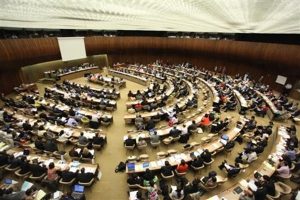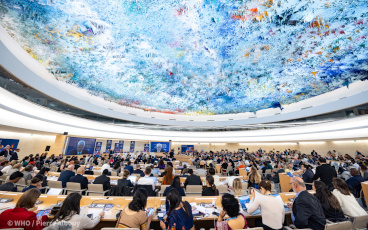Global health leaders express concern over polio funding gap
The global health community signalled strong commitment to polio eradication this week, underlining the financial needs to finish the job.

WHO/Pierre Albouy
24 May, Geneva – Delegates at the World Health Assembly (WHA) focused on the ‘significant advances’ since the launch of a new strategic plan and new, bivalent oral poliovirus vaccine in 2010. In India and Nigeria, the source of all importations of wild poliovirus into previously polio-free countries in recent years, polio cases declined by 95% between 2009 and 2010; during the same period polio cases due to the type 3 virus declined by 92% globally.
Delegates called for strong national and sub-national leadership by political authorities for the implementation of polio eradication strategies and highlighted the need for countries to significantly strengthen routine immunization.
Delegates expressed particular concern over the funding gap of US$ 665 million to fully carry out polio eradication activities in 2011 and 2012. Several delegates called for levels of political and financial commitment to be sustained until the job is done, reminding the Assembly of the estimated minimum financial benefits of eradication over the next 25 years of US$ 40-50 billion, primarily to low-income countries.
Both donors and polio-affected countries highlighted the resources they were making available and called on others to step forward.
Delegates requested WHO to provide additional technical support to countries with ongoing, re-established polio transmission (Angola, Chad, Democratic Republic of the Congo), to continue to pursue research for post-eradication risk management and to help countries maintain high-quality surveillance and population immunity until eradication is complete globally.
A week before, in her opening address to the WHA, WHO Director-General Dr Margaret Chan told the assembled Health Ministers of the world, “We have been encouraged by a 95% drop in cases in India and Nigeria. But the job is not yet finished and we must see this through to the end.”
Bill Gates, Co-chair of the Bill & Melinda Gates Foundation, was one of the keynote speakers at the Assembly. He reminded global health leaders that the long fight to end polio “demonstrates that technology is only as effective as the leaders delivering it.” He challenged health authorities to reach every child with vaccine and donors to fund the final steps of polio eradication.
The WHA delegates’ discussion came a week after Margaret Chan and Bill Gates met with high-level representatives of polio-affected and donor countries to discuss actions in response to the report of the Independent Monitoring Board. More













